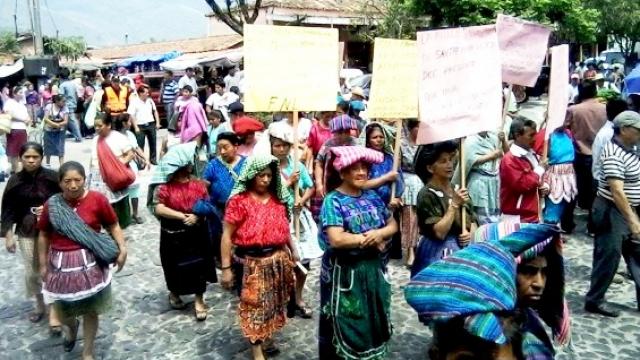
Photo: Marta Molina
May Day events in the city of Antigua Guatemala — the regional capital of Sacatepéquez — are traditionally lighthearted and festive. People from Guatemala City, especially the mestizo population, travel to the colonial city to enjoy its historical atmosphere, eat delicious food and enjoy the landscape at the base of the Hunahpú volcano.
But on May 1 this year, visitors encountered a very different scene: a march of both commemoration and protest for International Workers’ Day. Not in recent memory have Antigua’s workers, peasants and unions organized a May Day march like this one, demanding economic rights and an end to the increasing militarization of the country’s security policy.
Many of the 300 participants were indigenous peasant women, wearing traditional dress. These women marched through the streets of Antigua with posters demanding better working conditions and shouting out labor and campesina slogans: “Only united can women defend their rights!” and “The working woman of Santa María de Jesús is here!“ The Union of Education Workers of Guatemala (STEG), the Council to Protect the City of Antigua, the Municipal Market Workers and the recently-organized Photographers’ Union all participated.
The protesters arrived at Antigua’s Central Plaza and stopped in front of El Palacio de los Capitanes Generales. There they made public denouncements of the governor of the municipality and two legislators to whom they also presented a document outlining their goals: justice for the assassinations of activists, sufficient budget allocations for the school year, an increase in budget destined to protect Antigua’s historical monuments, and better government control over the consumer basket, fuel prices and electricity prices in light of unprecedented increases.
Upon presenting their demands, the marchers lamented that the regional governor, Teresa de Jesús Chocoyo Chile, and Congressman Rolando Pérez were not present. In their place, Congresswoman Regina Guzmán, of President Otto Pérez Molina’s right-wing Patriotic Party, received the document. She asked for “patience,” given that “when we took power we encountered a difficult situation which we have had to work on fixing, and that takes time.” Also receiving the demands was Congressman Sergio Leonel Celis Navas from the Renewed Democratic Liberty Party (LIDER), who said that the workers’ demands were just and that efforts should be made to address them. Celis also lamented Chocoyo Chile’s absence.
The unions, in particular, called attention to the militarization that the country has been undergoing as a means of improving security. According to Professor Rodrigo Hernández Boche, secretary general of STEG:
"A key part of Otto Pérez Molina’s platform was security. In fact, one of the mottos of the current government is that of a 'heavy hand against violence.' Ever since his government began, insecurity has increased and our colleagues have been assassinated. Up until now, we haven’t received any clarification of the events, but we don’t doubt that these could be repressive tactics that the military government was accustomed to perpetrating in its day."
The new “heavy hand” remilitarization security policies are already affecting the country, especially in areas like Santa Cruz Barillas, Huehuetenango, where the government declared a state of emergency earlier this month. Hernández expressed fears that the war-torn country might be remilitarized. “The opposition will do everything necessary to avoid this,” he said. “The [1996] peace accords, even though they were never properly implemented, are a reference for international law and a touchstone that will help us to avoid the remilitarization of the country.”
Currently, Otto Pérez Molina’s government is following through with its promise to respond to the often drug-related criminality now sweeping Guatemala with a “heavy hand,” as well as legal reforms that threaten respect for human rights. STEG has declared that it is "a shame on an international stage that Guatemala has chosen a military man as president, bearing in mind the massacres that even he is implicated in, and that have never been investigated. But organized civil society will persist in its opposition. We did so in our call for people not to vote for military officers, because we should not lose our historical memory, just as other countries should not lose theirs."
According to Rodrigo Hernández, “This is about the beginning of strengthening the workers of Sacatepéquez. As we have always said, the teachers also teach by fighting, and today we are teaching that only through organizing ourselves can our labor rights be respected and, above all, only through organizing ourselves can we breathe life into the struggle that we must now undertake out of necessity.”
3 WAYS TO SHOW YOUR SUPPORT
- Log in to post comments













